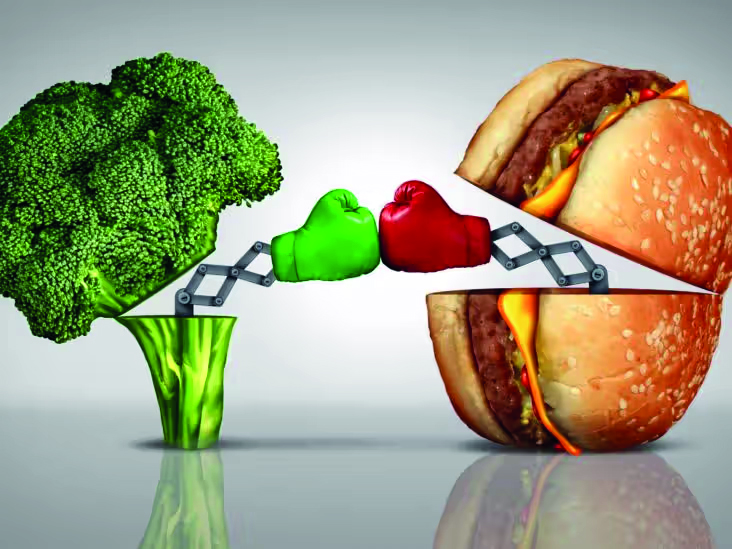 Imagine a singular, profound change that could dramatically reduce your risk of heart disease, stroke and even cancer. This pivotal question has captivated a dedicated cadre of doctors and researchers for decades, and their groundbreaking findings are now spotlighted in the acclaimed documentary, ‘Forks Over Knives’. The consensus? Adopting a whole-foods, plant-based diet may not just improve your health – it could very well save your life.
Imagine a singular, profound change that could dramatically reduce your risk of heart disease, stroke and even cancer. This pivotal question has captivated a dedicated cadre of doctors and researchers for decades, and their groundbreaking findings are now spotlighted in the acclaimed documentary, ‘Forks Over Knives’. The consensus? Adopting a whole-foods, plant-based diet may not just improve your health – it could very well save your life.
This revolutionary approach may challenge much of the dietary wisdom you’ve encountered, yet the experts behind ‘Forks Over Knives’ are unyielding in their convictions. In ‘Prevent and Reverse Heart Disease’, Dr. Caldwell Esselstyn articulates the dangers of animal products, asserting that meat, dairy, and fats damage the endothelial lining of our blood vessels, leading to heart disease and stroke. Complementing this, Dr. Colin Campbell’s ‘The China Study’ reveals a compelling correlation: as meat and dairy consumption rises, so too the rates of cancer and other chronic diseases, while traditional plant-based diets correlate with significantly lower risks. An ever-increasing body of expert voices reinforces this critical message: nothing rivals the health benefits of a plant-based diet.
As Parsis, we take immense pride in our culinary heritage – savoring mutton pulao, eggs in myriad forms, and our beloved dhansak. However, I urge you to consider an equally significant treasure: The China Study. This monumental research serves as a beacon, guiding us towards longer, healthier lives, allowing us to celebrate our cherished traditions with renewed vigor.
The Scientific Foundations Of The China Study
Conducted by renown researchers at Cornell University, USA, The China Study is one of the most comprehensive investigations into the relationship between nutrition and disease. It’s a rigorous, peer-reviewed examination that has influenced countless health and nutrition texts with astonishing revelations: populations with higher animal-based food consumption exhibit significantly increased rates of chronic illnesses such as diabetes, heart disease, and cancer. Conversely, those embracing plant-centric diets enjoy markedly lower incidences of these afflictions.
For our community, this compelling evidence suggests that transitioning toward a plant-based lifestyle is not merely a dietary fad but a scientifically substantiated choice that can save lives and thus our community.
Potential Detrimental Effects Of Animal Protein on Health
The Reality of Protein: A pivotal discovery highlights how our bodies metabolize protein. While we have long equated protein with strength, an ethos deeply ingrained in our culture, not all protein is created equal. Animal proteins, particularly casein found in dairy, are known to promote growth of cancer cells when consumed in excess. In stark contrast, plant-based proteins do not carry this danger potentially making them a far healthier alternative.
Cholesterol Implications: Given our genetic predisposition to heart disease, our fondness for so-called rich foods can be perilous. The China Study illustrates that diets high in animal products elevate cholesterol levels, significantly heightening the risk of arterial blockages. In contrast, plant-based diets help maintain lower cholesterol, thus preventing these life-threatening conditions.
Inflammation and Immunity: Diets abundant in saturated fats from animal sources incite inflammation, compromising immune function. Research from The China Study indicates that individuals consuming more plant-based foods experience lower levels of inflammation, thereby enhancing their defense against disease. This mirrors the solidarity we exhibit as a community – supporting each other in times of need, but with far-reaching benefits for our health.
Embracing the Plant-Based Journey: A Culinary Reawakening
You may wonder, “Can a Parsi truly adopt a vegan lifestyle? What about my cherished kheema-pav and mutton-pulao?” The gratifying truth is that a vibrant plant-based diet does not necessitate sacrificing flavor or satisfaction. Consider a culinary renaissance that allows you to explore healthier eating while reconnecting with our roots. Substitute animal proteins with plant-based alternatives like different dals, chickpeas and tofu. Envision a vegan dhansak featuring panchrangi dal and veg kababs or a colorful salad brimming with roasted vegetables – the culinary possibilities are endless.
Reimagining Our Feasts: The notion of a vegan Parsi feast may initially seem radical, but recognize this: plant-based eating can be rich and celebratory. You can create a sumptuous spread as delightful as any traditional Parsi lagan-nu-bhonu, simply with a few thoughtful modifications. Instead of a heavy mutton pulao, experiment with a nutrient-rich vegetable berry pulao, anyways the depth of flavor always arises from spices rather than meat.
Dairy Alternatives You’ll Love: Dr. Campbell’s research identifies dairy as a significant contributor to various health issues. While many of us have a deep affection for milk, a plethora of plant-based alternatives, such as almond, coconut, and oat milk, allows you to continue enjoying your daily chai or ravo without the associated health risks. Many of these options are fortified with essential vitamins and minerals, making them much healthier than the hormone laden adulterated milk pouches.
The Long-Term Advantages of a Plant-Based Lifestyle
The implications of The China Study are clear: populations thriving on plant-based diets experience substantially lower rates of heart disease, cancer, and diabetes. For our community, this means fewer medical visits, reduced dependency on medications, and an abundance of energy to embrace life – be it at family gatherings, joyous navjote-lagans, or cherished celebrations.
This research advocates for plant-based eating not only for immediate benefits but as a long-term investment in our well-being. By curbing our consumption of animal products, we empower our bodies to heal, regenerate, and remain free from disease. As a community known for our longevity, let us ensure that our lives are also imbued with health and vitality.
A Personal Reflection on Plant-Based Living
As a vegan Parsi, I can affirm that this transition is more accessible than it appears. While I may occasionally get tempted for a traditional poro, the heightened energy and overall well-being I derive from a plant-based diet far surpass any fleeting cravings. With the abundance of vegan alternatives available today, I feel liberated – free from the shackles of cholesterol and the health risks that accompany it.
So, esteemed fellow Parsis, if you wish to continue enjoying family celebrations, Parsi New Year feasts, and the warmth that accompanies them, embrace change. The China Study empowers us to lead vibrant, fulfilling lives. Let us honor our rich traditions by evolving them in pursuit of better health. We have adapted before, and we can certainly do so again, this time with a bounty of greens on our plates!
- The Healing Power Of ‘Shinrin-Yoku’ (Forest Bathing) - 28 December2024
- The Incomparable Health Benefits Of Plant-Based Diet - 30 November2024
- The Role Of Physiotherapy In Mental Health: A Holistic Approach - 28 September2024
